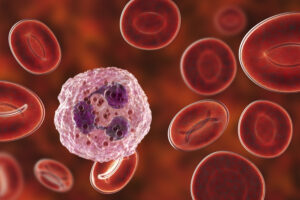Duffy negativity is common in Sub-Saharan Africa and the Arabian Peninsula, and approximately 70% of self-identified Black individuals in the U.S. do not express the Duffy antigen. Individuals who lack the Duffy antigen are resistant to Plasmodium vivax malaria, buy may develop alloantibodies when transfused RBCs. Duffy-negative individuals also have a lower peripheral absolute neutrophil count, but do not normally experience increased infections since myeloid maturation and neutrophil function are preserved. However, standard criteria for grade 2 neutropenia (absolute neutrophil count [ANC] < 1500 X 109/L) and febrile neutropenia (temperature > 38.3°C and ANC <1000 X 109/L) may not be appropriate for oncology patients with Duffy-null-associated neutrophil counts (DANC) based on data from a recent retrospective, single-center study. Briefly, 136 patients (mean age, 65 years; 46% female; 54% non-Hispanic Black) with multiple myeloma (MM) or systemic light chain (AL) amyloidosis receiving daratumumab therapy who were typed for Duffy status were evaluated. Before chemotherapy, 34% (17/50) of patients with DNAC had neutropenia compared to 10% (8/79) of Duffy positive patients. During chemotherapy, 85% (44/52 patients) with DNAC had neutropenia compared to 48% (39/82) of Duffy positive patients, and no cases of febrile neutropenia were observed in patients with DNAC compared to 7 cases (8%) in Duffy positive patients. Duffy status did not affect supportive treatments or stem cell collections. Strict ANC cutoffs may not be appropriate for individuals with DNAC, but further prospective studies are needed to better understand the impact of Duffy status on clinical outcomes.
Reference:

